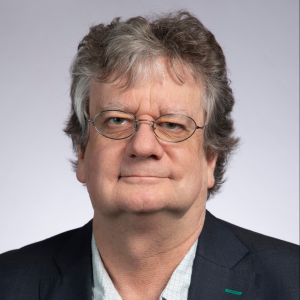Emeriti

April 15, 2025
Charles Nilon
From 1997-2020 Nilon was a co-principal investigator on the Baltimore Ecosystem Study (BES), one of the original urban ecosystems projects included in the National Science Foundation’s Long-Term Ecological Research program. His work with the BES focused on understanding how ecological and socioeconomic factors influence bird species composition and abundance. Because urban areas are homes for people as well as wildlife, Nilon’s research also considers the role of nature as part of an individual’s day-to-day environment, and environmental justice issues associated with access to nature. Nilon and his students have worked on projects Columbia and St. Louis that seek to understand…

Aug. 24, 2022
Mary McDonald

Aug. 24, 2022
Pauline Landhuis

July 14, 2021
Deanna Sharpe
Educational background PhD, Family Resource Management, Iowa State University MS, Economics, Iowa State University BS, Economics, Southwest Missouri State University…

Sep. 7, 2019
Gerald Hazelbauer, PhD
Education BS Biology Williams College Williamstown, Mass. MS Biology Case Western Reserve University Cleveland, Ohio PhD Genetics University of Wisconsin Madison, Wis. Research Area Transmembrane receptors and sensory transduction in bacterial chemotaxis. Research Description The aim of our research is to elucidate molecular mechanisms of transmembrane receptors and sensory transduction. For more than 40 years our research group has provided important information about the transmembrane chemoreceptors and signaling complexes that mediate chemotaxis in Escherichia coli. We have helped make bacterial chemotaxis the best understood signaling system in biology and a favored subject for systems biology. Our experimental approaches combine biochemistry,…

Sep. 2, 2019
Thomas P. Quinn
We have an established research program to develop radiolabeled peptides, proteins and nanoparticles as tumor specific diagnostic and therapeutic agents. Combinatorial peptide and antibody fragment libraries are being employed to identify molecules that preferentially bind tumor antigens. The tumor-avid peptides, antibody fragments and nanoparticles are subsequently engineered to bind the medically important radionuclides into their structures. Finally, the radiolabeled peptides, proteins and nanoparticles are investigated for their abilities to target tumor cells in vitro and in vivo in support of eventual clinical translation. Radiolabeled Melanoma avid α-MSH Peptide Analogs: The goal of this project is to design radiolabeled alpha-melanocyte stimulating…

Sep. 2, 2019
Bruce A. McClure
Research in the McClure lab is focused on understanding how pollen pistil communication controls plant mating. We study S-RNase-based self-incompatibility in Nicotiana and interspecific pollen recognition and rejection between tomato and its wild relatives. The genus Nicotiana is useful because of its ease of experimental manipulation, and the inter- and intra-specific compatibility relationships are well known. For example, N. alatadisplays gametophytic self-incompatibility (SI). Self-pollen and pollen from closely related plants are rejected, thus maintaining hybrid vigor. N. alata also has specific mechanisms for recognizing and rejecting pollen from related species such as N. plumbaginifolia and N. tabacum. Likewise, tomato, Solanum lycopersicum (formerly Lycopersicon esculentum), also has well defined crossing relationships with its…

Jan. 10, 2018
Michele Warmund
Educational background Ph.D., Agronomy/Weed Science, University of Missouri M.S., Horticulture, Kansas State University B.S., Horticulture, Kansas State Universtiy…

Jan. 10, 2018
Robert Sharp
Sharp is a Chancellor’s Professor and Curators’ Distinguished Professor Emeritus of Plant Sciences at the University of Missouri (MU). He received his BS and Ph.D. (with Bill Davies) degrees from Lancaster University in the UK, and after postdoctoral work at the University of Illinois-Urbana (with John Boyer) and the University of California-Davis (with Ted Hsiao and Wendy Silk), joined the faculty at MU in 1986. His research career has emphasized the physiology of plant adaptation to water deficits (drought), with a primary focus on mechanisms of root growth regulation in maize (corn). In May 2021 he served as Chair of…

Jan. 10, 2018
James Schoelz
The Jim Schoelz lab is working to understand the environmental and genetic factors that influence the pathogenicity and host range of plant viruses. They have identified a gene in cauliflower mosaic virus (CaMV) that triggers a hypersensitive defence response in solanaceous species. The hypersensitive response (HR) to plant pathogens, including plant viruses, is defined as a resistance response in which the plant pathogen remains localized in necrotic lesions on the inoculated leaf. In general, necrosis and resistance are closely associated, and considered physiologically and genetically linked phenomena. Schoelz has found that the HR of Nicotiana edwardsonii to CaMV can be…